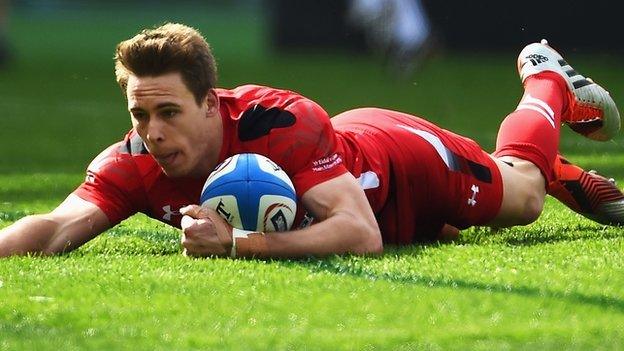Six Nations: Final day was surely championship's most thrilling ever
- Published
- comments

Ireland retained the Six Nations title after a breathtaking final day of the championship
Somewhere, shaking his cauliflower ears in dismay, a grizzled old retired prop was probably secretly wishing someone would just stick the ball up his jumper and make a cautious three inches.
For everyone else watching this was surely the most thrilling day that Five or Six Nations rugby has seen: a fantasy finale, a chest-squeezer and knee-knocker, a day to fall back in love.
There are the stats: 221 points scored across the three matches, the most in a single weekend; 27 tries, run in from deep and wide and everywhere in between.
There was England's record score against France, Ireland's biggest away win, the most tries Wales have scored in one championship half.
Then there was the style. This was rugby we thought had died and been laid to rest, killed by detailed analysis and the professional urge to be sensible.
Sensible? This was glorious chaos, March madness to put a spring in every watcher's step and an ulcer in the stomach of every defence coach.
Six Nations Catch-Up: The best action from the final week
It was a day when a 33-year-old 19-stone prop, Vincent Debaty, could track his rampaging winger 60 metres to dive over in the corner, when George North could score a 10-minute hat-trick of tries and make not a single headline, when France could make 747 metres with ball in hand and still lose by 20 points.
At various points in the afternoon England were first in the table, second, third, briefly fourth, back to third and then finally into second again, another metre on a rolling maul away from the full round trip.
Scotland? For their supporters it was like being invited to the most marvellous house party imaginable, only to be left holding the coats in the hall as everyone else went bananas on the dance-floor.
This was a very long afternoon that ended with very short fingernails.
From the start everything seemed back to front: grey and cold in London, sunny and fresh in Edinburgh, calculators taking the place of quaffing among those holding champagne flutes at the patrician picnics in Twickenham's West car park.
How remarkable final day unfolded |
|---|
In first game Wales only lead 14-13 against Italy at half-time |
But seven second-half tries see them win 61-20 and go top |
Ireland need a 21-point win over Scotland and lead 20-10 at break |
Ireland go on to win 40-10, putting Wales out of running |
England chase a 26-point win over France to take title |
France lead 15-7 after 18 minutes in a remarkable game |
England recover to win 55-35, but trophy ends up in Irish hands |
There have been final-day thrillers before, not least a year ago when only a French forward pass in the last minute of the last game denied England the title at Ireland's expense.
Eight years ago France, Ireland and England were tied on six points each before the final weekend. A 51-24 Irish victory over Italy in the first game meant France needed to beat Scotland by at least 24 points, something they did through Elvis Vermeulen's try in the dying seconds., external
But the final match fizzled away, England not just failing to pull off the required huge win in Wales but failing to pull off the win at all.
On Saturday it got better with every contest. Anything you can do, I can do better.
First Wales, with just a one-point lead at half-time, without their first-choice front row and having lost points machine Leigh Halfpenny to injury, accelerated away in Rome to score 47 second-half points and set their rivals an improbable target.
That seemed to be enough, a guarantee that England's 19-year wait for a title won in front of their home crowd would stretch on past another World Cup.
Six Nations 2015: Ireland beat Scotland to win championship
Then Ireland, needing to win by 21 points on a ground where they had lost their past two and not won by more than seven points in a decade, stormed away to win by 30.
"Never," muttered an England supporter wearing red trousers and a redder face, "expect the Scots to do England a favour."
That should have been it, sufficient mid-afternoon fireworks to guarantee a damp squib in south-west London.
And the crescendo began, a game that was less like northern hemisphere rugby union than basketball on grass - you go down our end and score, we go down your end and score, not too much physical contact please.
Was it the greatest game Twickenham has seen? There was so much going on at such relentless pace that it was difficult to keep a grip on any historical anchors.
France's win here over New Zealand in the semi-finals of the 1999 World Cup was cut from the same exhilarating style - form going out of the window, scores to make you swoon, a result that no-one could have seen coming.
This was the same, but with 90 points and 12 tries.
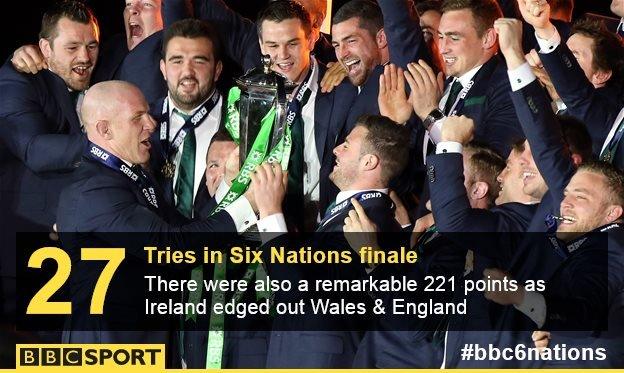
90 points? This isn't meant to happen in the Six Nations, not now everyone is equally professional.
Too boring, too predictable, too reliant on muscle and contact and penalties. Those are the complaints made of a competition that often favours the prosaic ahead of the pretty.
It should have been more. France missed half their penalties and more than half their conversions. England made 599 metres with ball in hand. The home side beat the defender 22 times, the visitors 24.
It was wonderful entertainment, punch following counter-punch, offloads everywhere, penalties tapped and gone before the sound of the whistle had reached your ears.
Six Nations 2015: England anguish despite 55-35 win against France
At one point Twickenham was actually rocking, the stands shaking. That a win by such a big margin could feel like a defeat to players and crowd told its own tale of dreams unleashed.
When breaths are caught and tapes are reviewed, England will reflect that perhaps the championship should have been secured. They lost two line-outs on the French five-metre line when the opposition were spent, lost James Haskell to the sin-bin for a daft trip to cede both momentum and points and then at the death seemed certain to drive over the line only to lose control of the ball with the line under their noses.
Had Scotland's Stuart Hogg not dropped the ball as he went over in the final minute up at Murrayfield, it wouldn't have mattered. Had Wales not shipped a late try to Leonardo Sarto's long-distance touchline sprint, and then seen replacement fly-half Luciano Orquera bang over an equally improbable touch-line conversion then they may have stolen it.
You even thought back to Haskell running into the post in the opening match in Cardiff seven weeks ago when he seemed certain to score, although in truth England's regrets should settle on the six clear try-scoring chances they scorned against Scotland a week ago.
There will be concerns too about a lack of ruthlessness and a fallibility under pressure going into a World Cup where success or failure is likely to be dependent on both.
Let that wait for another day. To complain after climbing off this rollercoaster would be to forget why we jump on board in the first place.
Archive: Six Nations 2015 - Dominant Wales thrash Italy in Rome
- Published21 March 2015
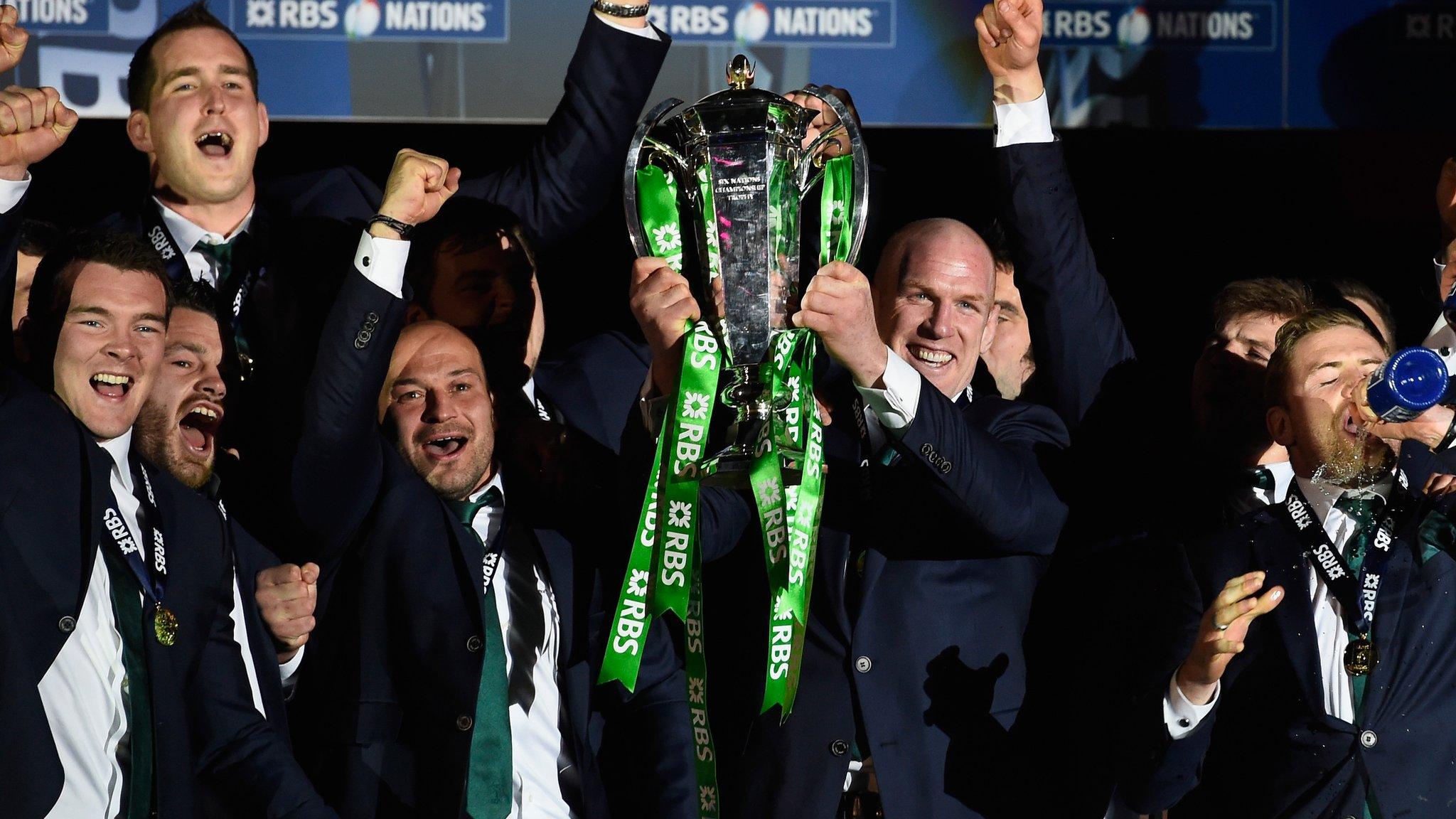
- Published21 March 2015
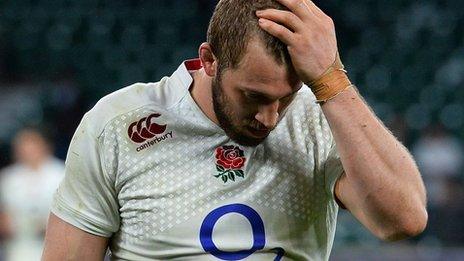
- Published21 March 2015
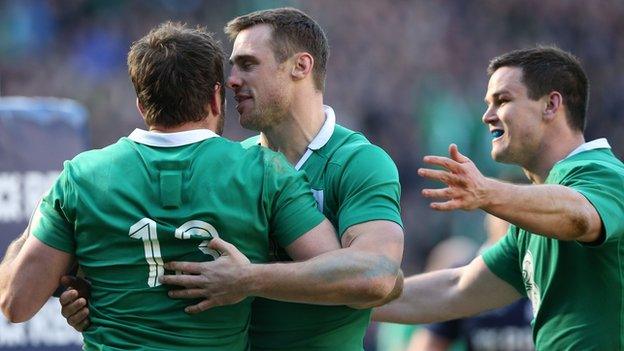
- Published21 March 2015
